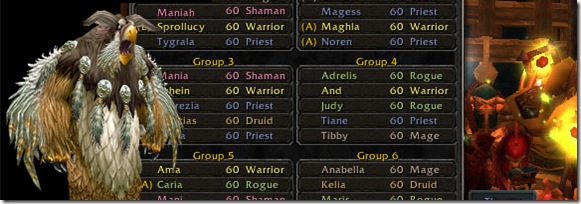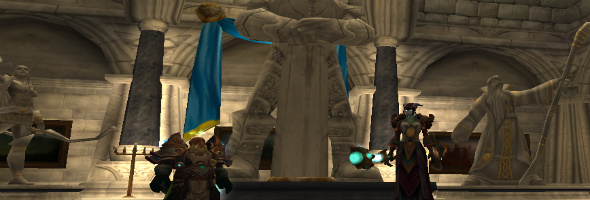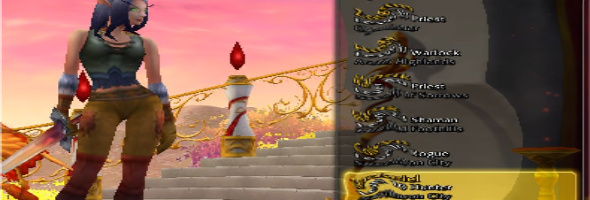So you want to be a raid leader? Well, you gotta ask yourself one question. Do I feel…
Ready?
I don’t know everything about raid leading by a long shot but I thought I’d share some of my musings on the hows and whys of this arcane practice.
Many players are shouting out on trade but it’s not to bawl their profession at passing trade watchers or haggle over the price of Poached Sunscale Salmon. Much of the cacophony in the traders’ market seems to be about recruiting to groups; quite often to PUGs, so much so that the LFG channel is making a permanent return. That means there are a lot of groups, and many players wearing the raid leader sash these days. So, this post is for everyone – people who raid lead and people who are led in raids.
1) Introduce the raid at the beginning. I call it ‘housekeeping’. You should work out your own style. This approach is fair on the players in the group and particularly important in PUGs – it puts everyone on level ground. They know what is expected of them. You’re also introducing yourself and presenting as a bit more than a shadowy stranger wearing the master looter crown.
Personally there are a few things I like to talk about here. In Herding Cats we have a strict zero tolerance policy against griefing and bad manners – or as my guild leader puts it, ‘That Guy’. I make it clear to the group members that we expect them to be polite and friendly. This gives everyone a fair warning in advance and introduces the raid as a safe place. I then also assure the group that they don’t need 10k DPS, we don’t expect everyone to know all the tactics and that we’ll explain them, but remind them that fun is the main aim of the game. Then we get onto less exciting things such as hush in the librar- sorry, raid spam, and loot rules.
Several times I’ve had players whisper me during the housekeeping saying that they feel they’ve joined a mature raid and they appreciate knowing there are boundaries and safety nets applicable to the whole group.
2) Interaction. Remember that your group will get much further if they trust and respect you – and you them. Talk in full sentences. Keep your tone polite at all times. Join in on banter and jokes. Keep the chatter going – ask people what their favourite chocolate bar is, if you like. Answer questions, particularly as the raid is forming – that’s one of the most likely times for a raid to fold. Above all: pay attention to your group. They will feel like you know what you’re doing and just maybe you’ll feel that too.
People judge on first impressions in real life – they do in instances, too. Make a good first impression and then keep it up throughout. I’ve joined several PUGs recently being led by strangers who have ignored my questions about tanking or healing assignments. Just the other day a random raid leader decided that our PUG didn’t need two shadow priests for Naxx25. These things do not inspire confidence in me as a raider; put yourself in your raiders’ shoes and think about what would make them feel comfortable.
3) Be approachable. Let the group know that they can whisper you or another group member you trust with questions, comments or suggestions. Also let the group know that they can offer suggestions for tactics in raid chat at an allotted time, such as after tactic spam – and that you will listen to the suggestions and decide on the final tactics. This can be a useful group to keep a group interested if it’s a new encounter for the group or even you, or something is proving very difficult for whatever reason.
In Herding Cats we usually make it clear at the beginning that players can whisper myself or Ekatrina if they need something cleared up. If a player has a specific role in a fight – such as dealing with brittle adds during the Ignis encounter – we whisper them to check they’re ok with the role. We also try to get a general idea, group size permitting, how experienced each raider is so that we can keep an eye out for anyone who might need support or to be whispered to check they’re clear before starting the encounter. Some might say this is extra work or babysitting but there’s nothing wrong with it – it can make a new or less confident player feel supported and can avert a wipe for the whole group. Indeed, we’ve acquired several extremely loyal and friendly raiders because we took the time to care for them when they first raided with us.
4) Tactics: don’t assume. Don’t assume for a moment that everyone knows the tactics if you’re in a group with one or more PUGger or new guild member. This is relevant for any encounter. Remember that new players are getting to 80 every day. Some veteran players are coming anew to raiding from other styles of play or have their own idea of tactics. Some players will have suggestions – some of them will be good. Make time for those and take them into account for the final decision on How It Will Go. Explain your tactics for the encounter, even if it’s just the bare essentials of what a player needs to know to not kill the raid.
Also don’t assume players know YOUR tactics. There are several fights which can be done slightly differently. Plenty of times we’ve led a brave PUG to Thaddius and said +++++Thaddius—— only to have two or three people adamantly insist it’s the other way around. A lot of the time it doesn’t matter which way round you do the tactics; what does matter is that you make sure that there is one, clear set of tactics.
5) Know your stuff. Have a solid idea of the encounter’s tactics. You might know the tactics from a melee DPS point of view but you need to be able to advise *everyone* in the raid, whatever role they play. Read up on encounters on sites like WoWwiki or watch videos on TankSpot and Youtube. The trick then is to explain the tactics in a clear, concise way that players will listen to.
If you have time and think you will raid lead regularly then I recommend writing documents in advance with your own tactics spam for more complicated fights so that you can copy/paste or read it out during the raid. This is what i did when leading a group into Ulduar, many of us for the first time. There’s a lot going on and a lot of things that players need to keep in the back of their mind, so I split the spam up with an ‘everyone’ section first and then descriptions by group role. This lets ranged DPS, for example, know what will affect them directly and reduces the loss of focus during tactic spam; it also provides for those players who are curious about tactics for other roles. Writing it in advance also allows you to pare down irrelevant information rather than getting carried away during the raid.
In my opinion those are the first five of the widely applicable basics. They are very much my own opinion. i appreciate that everyone has their own style of raid leading and approaches it differently. Not only that, different situations need to be handled differently. Look out for the other five golden rules in the Book of Mimetir coming soon.
What do you think – do you find any of these helpful and plan to adopt them in your next run? How essential do you think careful raid leading is in a PUG and/or a guild group? Do you think I’m too much of a careowl and people should just “STFU u nub”? What’s *your* favourite bar of chocolate?





